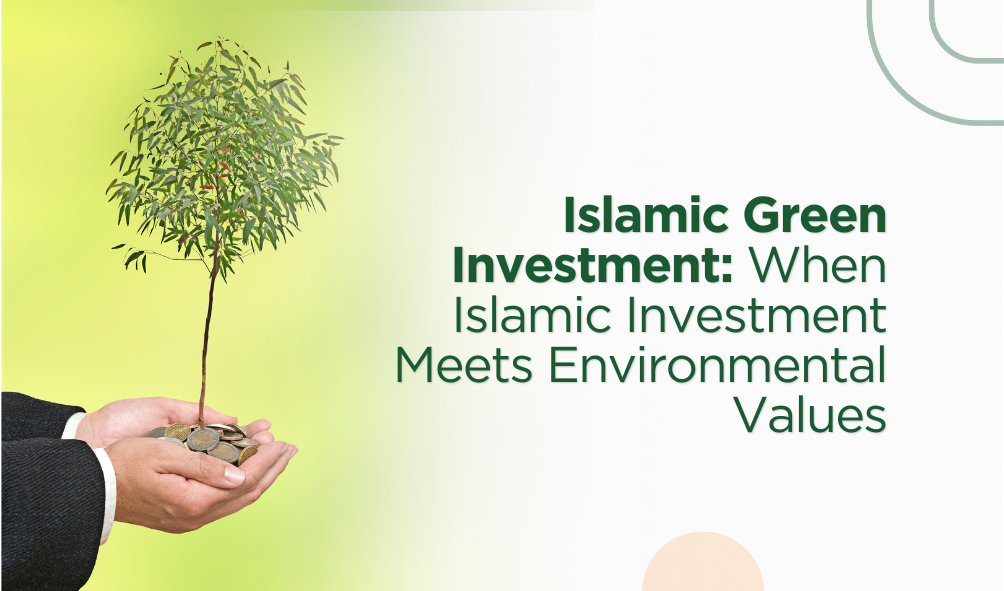Islamic Green Investment: When Islamic Investment Meets Environmental Values
Islamic green investment is an increasingly popular approach in the investment world, especially among global Muslim communities. This concept combines the principles of Islamic finance with sustainable investment goals focused on environmental preservation, aligning with global efforts to address climate change. At a time when the world is facing an urgent climate crisis, Islamic green investment offers an innovative solution that satisfies the need for profitable yet sustainable finance.
This article explores the concept of Islamic green investment, its potential and opportunities in Indonesia, its benefits, and the challenges faced in developing this investment model.
1. What Is Islamic Green Investment?
Islamic green investment is an investment approach rooted in the principles of Islamic finance, with an additional focus on environmental and social sustainability. It adheres to principles such as the avoidance of riba (interest), gharar (excessive uncertainty), and maysir (speculation). Furthermore, the projects funded by Islamic green investment must align with sustainability goals, avoiding environmental harm or involvement with industries contrary to Islamic law.
One example of Islamic green investment is green sukuk or Islamic green bonds. This instrument operates similarly to conventional bonds but follows Shariah-compliant finance and focuses on funding eco-friendly projects. Green sukuk have become popular in several countries, including Indonesia, as a sustainable investment alternative to fund projects such as renewable energy, waste management, and other green infrastructure. Through green sukuk, investors can feel confident that their funds are being used for positive, environmentally friendly purposes in line with Islamic teachings (Katadata, 2023).
Also read:Application of Maqashid Sharia in the Green Economy
2. The Potential of Islamic Green Investment in Indonesia
Indonesia holds vast potential to become a hub for Islamic green investment in Asia. According to a report from the United Nations Development Programme (UNDP), Islamic finance in Indonesia could contribute up to USD 50 billion toward climate mitigation and Sustainable Development Goals (SDGs). As the country with the world’s largest Muslim population, Indonesia is well-positioned to leverage Shariah-compliant financial instruments, such as green sukuk, to support environmentally sustainable projects.
The Indonesian government has also taken several steps to promote Islamic green investment, including issuing green sukuk in 2018 as part of its commitment to addressing climate change. These green sukuk have attracted interest from international investors, demonstrating a global market demand for Shariah-based green financial instruments. This step also reflects the significant role Islamic finance can play in funding environmental projects in developing nations that often lack funding for green initiatives.
Given this substantial potential, Islamic green investment can be an essential factor in accelerating Indonesia’s green economy, supporting the government’s commitment to achieving net-zero emissions by 2060, and creating new job opportunities in renewable energy and other green industries.
3. Benefits of Islamic Green Investment
Islamic green investment brings several crucial benefits not only for investors but also for society and the environment. Here are some of its primary advantages:
- Preserving Ecological Balance: Islamic green investment supports environmentally friendly projects focused on reducing carbon emissions and preserving ecosystems. For example, investments in renewable energy projects, such as solar, wind, and bioenergy, help reduce reliance on fossil fuels and mitigate environmental impact.
- Driving Sustainable Economic Growth: By focusing on green projects, Islamic green investment contributes to economic growth that is fair and sustainable. It not only creates jobs and generates economic returns but also ensures that its benefits are distributed fairly across society and for future generations.
- Reducing Investment Risk: Because Shariah principles prohibit excessive speculation and uncontrolled risk, Islamic green investment tends to be more stable than conventional investments. For instance, investments in renewable energy projects generally carry lower risk than those related to fossil commodities, which can be highly volatile.
- Supporting the Growth of Green Industries: The increasing interest in Islamic green investment is helping drive growth in industries focused on sustainability, such as renewable energy, clean transportation, and sustainable agriculture. This encourages innovation in green technology and accelerates Indonesia’s transition to a low-carbon economy.
Islamic green investment also aligns with Shariah’s objective to preserve nature and avoid harm, thus appealing to investors who seek both financial returns and adherence to religious values while protecting the environment (CNBC Indonesia, 2023).
Also read:Important Principles on How Islam Views Investment
4. Challenges and Development Strategies for Islamic Green Investment
Despite its potential, Islamic green investment faces several challenges in development, primarily regarding financial literacy and regulation. Many people, particularly in Indonesia, are not yet familiar with the concept of Islamic green investment, and this lack of understanding may hinder the broader adoption of instruments like green sukuk.
Some strategies to address these challenges include:
- Education and Awareness: It is crucial to educate the public about the long-term benefits of green investment and how these instruments provide both financial and environmental advantages. The government, financial institutions, and educational institutions can work together to introduce the concept of Islamic green investment on a broader scale.
- Government Support and Incentives: Governments can strengthen the ecosystem of Islamic green investment by providing incentives for green projects, such as tax reductions or easier access to project permits. Such support can attract more investors and accelerate the development of Shariah-based green projects in Indonesia.
- Strengthening International Collaboration: Collaboration with international financial institutions can help Indonesia expand access to funding and technology that support green projects. Moreover, support from international entities will strengthen Indonesia’s position in the global green finance market.
5. The Future of Islamic Green Investment: Hopes and Impact
Islamic green investment is not just a financial tool but a concrete effort to maintain environmental balance and support Shariah objectives to preserve nature. In the future, it is hoped that instruments such as green sukuk will continue to grow in popularity, both in domestic and international markets. With the potential to help achieve SDG targets, Islamic green investment is expected to become increasingly attractive, particularly in supporting sustainable development in Muslim-majority countries.
Indonesia can capitalize on this momentum to become a leader in Shariah-based green finance in Southeast Asia. With a growing number of green projects funded through green sukuk and other instruments, Shariah-based green investment is expected to help accelerate Indonesia’s transition toward a low-carbon and environmentally friendly economy, creating a positive social impact for future generations.
Also read:The Balance in Spending Wealth: Guidance from Surah Al-Furqan Verse 67

References
- CNBC Indonesia. (2023, April 11). Investasi hijau syariah, ekonomi berkeadilan ramah lingkungan. Retrieved from https://www.cnbcindonesia.com/news/20230411191156-8-429078/investasi-hijau-syariah-ekonomi-berkeadilan-ramah-lingkungan
- CNBC Indonesia. (2023, April 12). Investasi hijau syariah: jaga lingkungan meraih keuntungan. Retrieved from https://www.cnbcindonesia.com/syariah/20230412180544-29-429411/investasi-hijau-syariah-jaga-lingkungan-meraih-keuntungan
- Katadata. (2023). Sukuk hijau, alternatif investasi berbasis syariah. Retrieved from https://green.katadata.co.id/infografik/6604fb49c9963/sukuk-hijau-alternatif-investasi-berbasis-syariah
- United Nations Development Programme. (2023). New report reveals $50 billion potential of Islamic finance for climate emergency and SDGs. Retrieved from https://www.undp.org/indonesia/press-releases/new-report-reveals-50-billion-potential-islamic-finance-climate-emergency-and-sdgs







